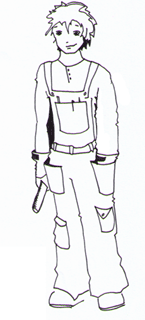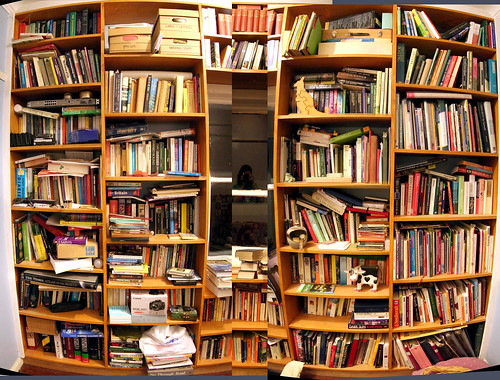I just received the list of books vice-presidential candidate Sarah Palin tried to ban when she was mayor in Wasilla, Alaska. The list originated from a colleague who received it from a colleague who received from a colleague at the University of Windsor. You may or may not have heard or read about it but you can get some background
here, and
here.
Here's the list of books that she wanted banned (this information is taken from the minutes of the
Wasilla Library Board):
A Clockwork Orange by Anthony Burgess
A Wrinkle in Time by Madeleine
L'Engle Annie on My Mind by Nancy Garden
As I Lay Dying by William Faulkner
Blubber by Judy
Blume Brave New World by Aldous Huxley
Bridge to
Terabithia by Katherine Paterson
Canterbury Tales by Chaucer
Carrie by Stephen King
Catch-22 by Joseph Heller
Christine by Stephen King
Confessions by Jean-Jacques Rousseau
Cujo by Stephen King
Curses, Hexes, and Spells by Daniel Cohen
Daddy's Roommate by Michael
Willhoite Day No Pigs Would Die by Robert Peck
Death of a Salesman by Arthur Miller
Decameron by Boccaccio
East of Eden by John Steinbeck
Fallen Angels by Walter Myers
Fanny Hill (Memoirs of a Woman of Pleasure) by John
Cleland Flowers For Algernon by Daniel
Keyes Forever by Judy
Blume Grendel by John
Champlin Gardner
Halloween ABC by Eve Merriam
Harry Potter and the Sorcerer's Stone by J.K. Rowling
Harry Potter and the Chamber of Secrets by J.K. Rowling
Harry Potter and the
Prizoner of
Azkaban by J.K. Rowling
Harry Potter and the Goblet of Fire by J.K. Rowling
Have to Go by Robert
Munsch Heather Has Two Mommies by
Leslea Newman
How to Eat Fried Worms by Thomas Rockwell
Huckleberry Finn by Mark Twain
I Know Why the Caged Bird Sings by Maya Angelou
Impressions edited by Jack Booth
In the Night Kitchen by Maurice
Sendak It's Okay if You Don't Love Me by Norma Klein
James and the Giant Peach by
Roald Dahl Lady Chatterley's Lover by D.H. Lawrence
Leaves of Grass by Walt Whitman
Little Red Riding Hood by Jacob and Wilhelm Grimm
Lord of the Flies by William Golding
Love is One of the Choices by Norma Klein
Lysistrata by Aristophanes
More Scary Stories in the Dark by Alvin Schwartz
My Brother Sam Is Dead by James Lincoln Collier and Christopher Collier
My House by Nikki Giovanni
My Friend
Flicka by Mary O'Hara
Night Chills by Dean Koontz
Of Mice and Men by John Steinbeck
On My Honor by Marion Dane Bauer
One Day in The Life of Ivan
Denisovich by Alexander Solzhenitsyn
One Flew Over The Cuckoo's Nest by Ken
Kesey One Hundred Years of Solitude by Gabriel Garcia Marquez
Ordinary People by Judith Guest
Our Bodies, Ourselves by Boston Women's Health Collective
Prince of Tides by Pat Conroy
Revolting Rhymes by
Roald Dahl Scary Stories 3: More Tales to Chill Your Bones by Alvin Schwartz
Scary Stories in the Dark by Alvin Schwartz
Separate Peace by John Knowles
Silas
Marner by George Eliot
Slaughterhouse-Five by Kurt Vonnegut, Jr.
Tarzan of the Apes by Edgar Rice Burroughs
The Adventures of Huckleberry Finn by Mark Twain
The Adventures of Tom Sawyer by Mark Twain
The Bastard by John
Jakes The Catcher in the Rye by J.D. Salinger
The Chocolate War by Robert
Cormier The Color Purple by Alice Walker
The Devil's Alternative by Frederick
Forsyth The Figure in the Shadows by John
Bellairs The Grapes of Wrath by John Steinbeck
The Great Gilly Hopkins by Katherine Paterson
The Handmaid's Tale by Margaret Atwood
The Headless Cupid by
Zilpha Snyder
The Learning Tree by Gordon Parks
The Living Bible by William C. Bower
The Merchant of Venice by William Shakespeare
The New Teenage Body Book by Kathy McCoy and Charles
Wibbelsman The
Pigman by Paul
Zindel The Seduction of Peter S. by Lawrence Sanders
The Shining by Stephen King
The Witches by
Roald Dahl The Witches of Worm by
Zilpha Snyder
Then Again, Maybe I Won't by Judy
Blume To Kill A Mockingbird by Harper Lee
Twelfth Night by William Shakespeare
Webster's Ninth New Collegiate Dictionary by the Merriam-Webster
Witches, Pumpkins, and Grinning Ghosts: The Story of the Halloween
Symbols by Edna Barth
Quite a list, isn't it?



























